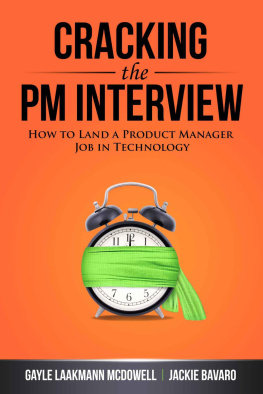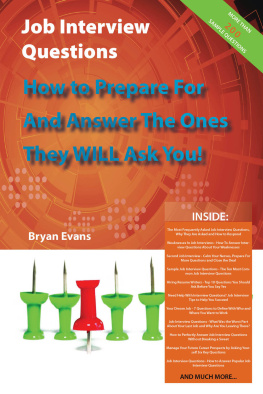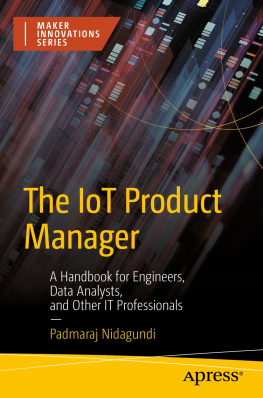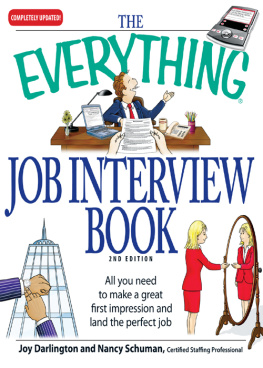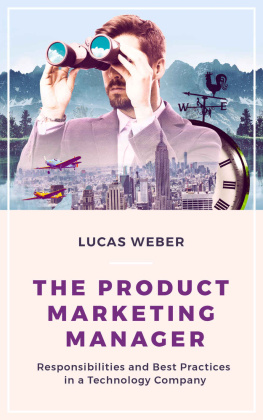CRACKING THE
PM INTERVIEW
How to Land a Product Manager
Job in Technology
Also by Gayle Laakmann McDowell
Cracking the Coding Interview
150 Programming Questions and Solutions
The Google Resume
How to Prepare for a Career and Land a Job at
Apple, Microsoft, Google, or any Top Tech Company
CRACKING THE
PM INTERVIEW
How to Land a Product Manager
Job in Technology
GAYLE LAAKMANN MCDOWELL
Founder and CEO, CareerCup.com
JACKIE BAVARO
Product Manager, Asana
CareerCup, LLC
Palo Alto, CA
CRACKING THE PM INTERVIEW
Copyright 2014 by CareerCup, LLC.
All rights reserved. No part of this book may be used or reproduced in any manner without written permission except in the case of brief quotations in critical articles or reviews.
Published by CareerCup, LLC, Palo Alto, CA. Version 1.01391280371759.
For more information, contact support@careercup.com.
978-0984782819 (ISBN 13)
To my little buddy, Davis.
~ Gayle
To Tim, who supports me in all my adventures.
~ Jackie
Table of Contents
Please join us at CrackingThePMInterview.com for additional resources and information, or to discuss questions with fellow PMs.
Introduction
Chapter 1
Product management is a strange role.
For many roles, getting from point A to point B is pretty obvious. If you want to get a programming job, you learn how to program. So you go to college for computer science or you learn to write code on your own. Ditto for being an accountant, lawyer, doctor, etc.
If you want to be a product manager, what do you do? There are no schools for product management. Theres no formal training. Its also not a role you typically get promoted into, exactly.
How, then, does one land a product manager job? Thats what this book is here to teach you.
Jackie and I have worked with countless current and aspiring product managers to help them learn how to get the right experience, how to position themselves appropriately, how to prepare for interviews, and how to ace them.
This book translates these many hours of coaching sessions and conversations into written form.
Why does this matter?
Product management shouldnt be this elusive role, accessible only to those who are lucky (and connected) enough to have someone explain what PMing is all about. Greater accessibility is a good thing for candidates and employers alike.
You, the candidate, are better able to position yourself for a job when you know what to expect. Its not about faking anything; you can actually acquire the experience you need once you know you need it.
When it comes time for interviews, youll able to prepare for their questions more effectively. You will learn how to describe your unique experiences and most important accomplishments. Youll learn how to tackle problem-solving questions. Youll understand what it means to think about the user. And, finally, youll solidify your technical skills.
Employers, in turn, get more qualified candidates. More relaxed and better prepared candidates perform in a way that is more consistent with their skillset. They know which accomplishments are most interesting and relevant to employers, and they can drive the conversation toward those things. They can demonstrate their problem-solving skills when they know thats what the question is about. They can learn the bits of knowledge that they need in order to tackle specific questions. This sort of preparation portrays a candidates skillset closer to how it would be on the job.
Taking the guesswork and randomness out of interviews is a good thing for everyone.
Who are we?
If you flip to the back of the book, you can read our credentials: Google. Microsoft. Apple. Startups. Hiring committee. Oodles of interviews and coaching sessions.
Yadda, yadda, yadda.
Thats all very well and good, but that wont tell you who we really are and how we got here, writing a book on landing a product management job.
I (Gayle) come from a deep engineering background, but Ive also spent a lot of time working with candidates: interviewing them for dev and PM roles, conducting mock interviews, coaching them on how to strengthen their answers, teaching them concepts that they dont understand, and discovering what their goals and passions are.
I learned two things through this. First, I learned how much even good candidates could improve their interview performance, with a bit of help. Second, I learned how little information there was about getting a product management role. Lots of people talked about how to be a good product manager, but few people talked about how to actually break into that field.
Except, of course, for my amazing coauthor, Jackie.
I stumbled across Jackies blog on Quora, the question and answer site. After following her for a bit, I was struck by a few things. First, she had worked for several of the top companies, so she was good enough to navigate these interviews herself. Second, her advice was to-the-point, actionable, and good. Third, she cared . She cared enough to write a blog to help people enter the PM profession.
Making the product management field more accessible is important to both me and Jackie. We believe that everyone benefits from this, and that is why weve written this book.
What now?
This book will not help you fake your way into a PM job. It will, however, give you a plan of attack, from the beginning to the end of the process.
We will show you what a product manager is and how the role varies from company to company. We will also describe how different companies think about their hiring process.
We will talk to product managers from a variety of backgrounds to understand how they broke into this field and to get their perspective on what makes a good product manager.
We will talk about the different backgrounds PMs tend to have and how you might make the transition given your background and interests.
We will show you how to write a great resume and cover letter. Some of this will be advice that applies outside of product management, but much of it is advice specific to product managers.
We will advise you on how to get ready for an interview: what sort of research you need to do prior to an interview and how to prepare for questions. We will tackle each of the major interview question typesincluding behavioral questions, estimation questions, product questions, case questions, and coding questionsand explain to you what an interviewer is looking for and how you master those questions.
We will help you put your best foot forward so you can get in the door.
As you read these pages, reflect on how you can draw out the strong points of your experience in an interview and how you can deliver more powerful responses.
We are here to help. Please join us online at crackingthepminterview.com for additional resources and tips.
And finally, just as software is never done, we hope this book will never be either. If you have suggestions, feedback, questions or just want to say hi, dont hesitate to drop us a note: gayleandjackie@careercup.com
Thank you, and good luck!
Gayle L. McDowell
facebook.com/gayle
twitter.com/gayle
technologywoman.com
quora.com/Gayle-Laakmann-McDowell
Jackie Bavaro
facebook.com/jackie.bavaro
twitter.com/jackiebo
pmblog.quora.com
quora.com/Jackie-Bavaro
The Product Manager Role
Chapter 2
What is a PM?
A PM is responsible for making sure that a team ships a great product.
Some people will say that the product manager (sometimes called the program manager or project manager) is like a mini-CEO of their product. Thats accurate in some ways, since a PM takes holistic responsibility for the product, from the little details to the big picture. The PM needs to set vision and strategy. The PM defines success and makes decisions.
Next page
